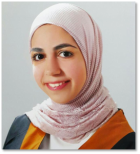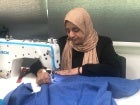Breadcrumb
Stories
Topic
- Show all (573)
- Financing for gender equality (-) (12)
- Information and communications technology (ICT) (-) (4)
- Economic empowerment (84)
- Gender equality and women’s empowerment (63)
- Ending violence against women and girls (39)
- Humanitarian action (32)
- Peace and security (30)
- Partnerships (23)
- Entrepreneurship (20)
- COVID-19 (15)
- 2030 Agenda for Sustainable Development (14)
- Youth (14)
- Employment (13)
- Human rights (11)
- Leadership and political participation (11)
- Crisis response and recovery (10)
- Health (10)
- Gender, culture and society (9)
- Education (8)
- Generation Equality (8)
- Migration (7)
- Sustainable Development Goals (SDGs) (7)
- Financial resources (5)
- HeForShe (5)
- Innovation and technology (5)
- Peacebuilding (5)
- Poverty (5)
- Training (5)
- Women with disabilities (5)
- Local development (4)
- Beijing Platform for Action (3)
- Climate change (3)
- Communications and media (3)
- Gender equality and inequality (3)
- Gender mainstreaming (3)
- Men and boys (masculinity) (3)
- Rural women (3)
- UNiTE campaign (3)
- Women’s rights (3)
- Access to basic services (2)
- Access to justice and legal protection (2)
- Anti-violence interventions (2)
- Businesses and foundations (2)
- Commission on the Status of Women (2)
- Conflict, war (2)
- Executive Director (2)
- Gender statistics (2)
- Governance and national planning (2)
- Markets (2)
- Science and technology for development (2)
- Trafficking/sexual exploitation (2)
- Unpaid work (2)
- UN Security Council resolution 1325 (2)
- UN Trust Fund to End Violence against Women (2)
- Campaigns (1)
- Capacity development (1)
- Citizen engagement (1)
- Civil society (1)
- Civil society participation (1)
- Decision-making (1)
- Electoral systems and processes (1)
- Feminicide/femicide (1)
- Financial and economic crisis (1)
- Fund for Gender Equality (1)
- Gender-responsive budgeting (1)
- Gender data gaps (1)
- Gender data production and collection (1)
- Health care services (1)
- Human and financial resources (1)
- Institutional mechanisms (1)
- Intergovernmental processes (1)
- Migrant workers (1)
- National committees (1)
- National mechanisms (1)
- National planning (1)
- Parliamentary development (1)
- Peacekeeping (1)
- Political empowerment (1)
- Political violence (1)
- Rape/sexual assault (1)
- Sexual harassment (1)
- Shelters (1)
- Social protection (1)
- Traditional media (1)
- Trust funds (1)
- UN Security Council resolutions (1)
- Violent extremism and terrorism (1)
Country
1 - 16 of 16 Results
Date:
In a groundbreaking collaboration, Nokia and UN Women have joined forces to advance global gender equality and women’s empowerment, in line with Agenda 2030 and SDG 5: Achieve gender quality and empower all women and girls.
Date:
Amira, a 37-year-old Syrian refugee, living in Karak Governorate, Jordan, leads her household of four children while her husband lives abroad.
Date:
Safa Ahmad Sayeda, a 37-year-old Jordanian mother of three, contributes to her family's financial stability as her husband nears retirement. After relocating to Karak governorate and closing her successful handicraft store, Safa faced an economic crisis.
Date:
Fatima Ali is a Syrian mother of 8 children, moved from Dara’a, Syria to Jordan in 2012 amidst the war in her country. Initially arriving without her husband, Fatima faced harsh conditions as they didn’t have access to water and electricity at that time in the camp.
Date:
At the heart of Zaatari Refugee camp, when Samaher arrived in Jordan in 2013, little did she know that she would become an example of resilience and empowerment for her family and community. With two sons and two daughters, Samaher's journey began with hope, but took a challenging turn.
Date:
Kinda Abu Quderi, a 52-year-old Jordanian from Karak, lives with her mother and supports her family financially. She runs an independent tailoring project and is a trainer at the Karak Oasis Centre. Kinda shared her experiences with the UN Women’s Oasis programme and its financial literacy training component.
Date:
Noor Al-Shalabi, a resilient 21-year-old Syrian woman and a devoted mother to her daughter, found relief and opportunity in her journey to Jordan. Having faced the complexities of life, including divorce, Noor embraced the chance to make a fresh start in a new country.
Date:
Aisha Al-Hamad, a 37-year-old Syrian woman and mother of five daughters, has a diverse professional background. Previously, she worked as a facilitator at a centre in the camp for students with special needs.
Date:
Isra’a Al-Zarazrah, a 31-year-old Syrian woman, embarked on a transformative journey when she moved to Jordan with her family in 2013. Married with two children, Isra’a sought opportunities to enhance her skills and contribute to her family's well-being.
Date:
Najwa, 33, a mother of five, is employed as a trainer in the beautician section at the UN Women Oasis Centre in Azraq Refugee Camp. Najwa has been caring and providing for her family as her husband is ill. She wants to pass on to her daughters the strength she gained for this experience.
Date:
Raghad Al-Momani, a hard-working, 40-year-old mother of two, became the breadwinner for her family after her husband became visually impaired in an accident a few years ago. She worked as an office administrator at a kindergarten for six years. But when COVID-19 hit, she lost her job.
Date:
Haneen Rafe ‘Moh’d Zayed, 24 years old, who recently started working as a Data Analyst in the Ministry of Digital Economy and Entrepreneurship.
Date:
I married at the young age of 16, still unfamiliar with the complexities of life and with my education incomplete. My husband, serving in the military, earned a salary that barely met our needs. Even when our daughter reached sixth grade, we continued to struggle financially, still paying off the furniture we bought when she was born.
Date:
Discussing gender equality in Jordan can lead to difficult conversations, as Balqees Shahin, a volunteer for the UN Women gender equality campaign HeforShe, has discovered. Marking International Day of The Girl Child on Monday, Ms. Shahin told UN News that online games can help young people to address gender issues.
Date:
Alia, 42, is a tailoring trainer at the UN Women Oasis Centre in Muwaqqar with a passion for learning. As a working mother, Alia continues to challenge herself and her cultural norms.
Date:
The ICT sector presents tremendous opportunities for women. It’s slated to become a very big chunk of the job market, with an estimated 90 per cent of jobs soon requiring ICT skills. But for women to seize these opportunities equally as men, we have to tackle the gender stereotypes and biases that prevent them from pursuing or making it big in STEM-related fields.
1 - 16 of 16 Results















